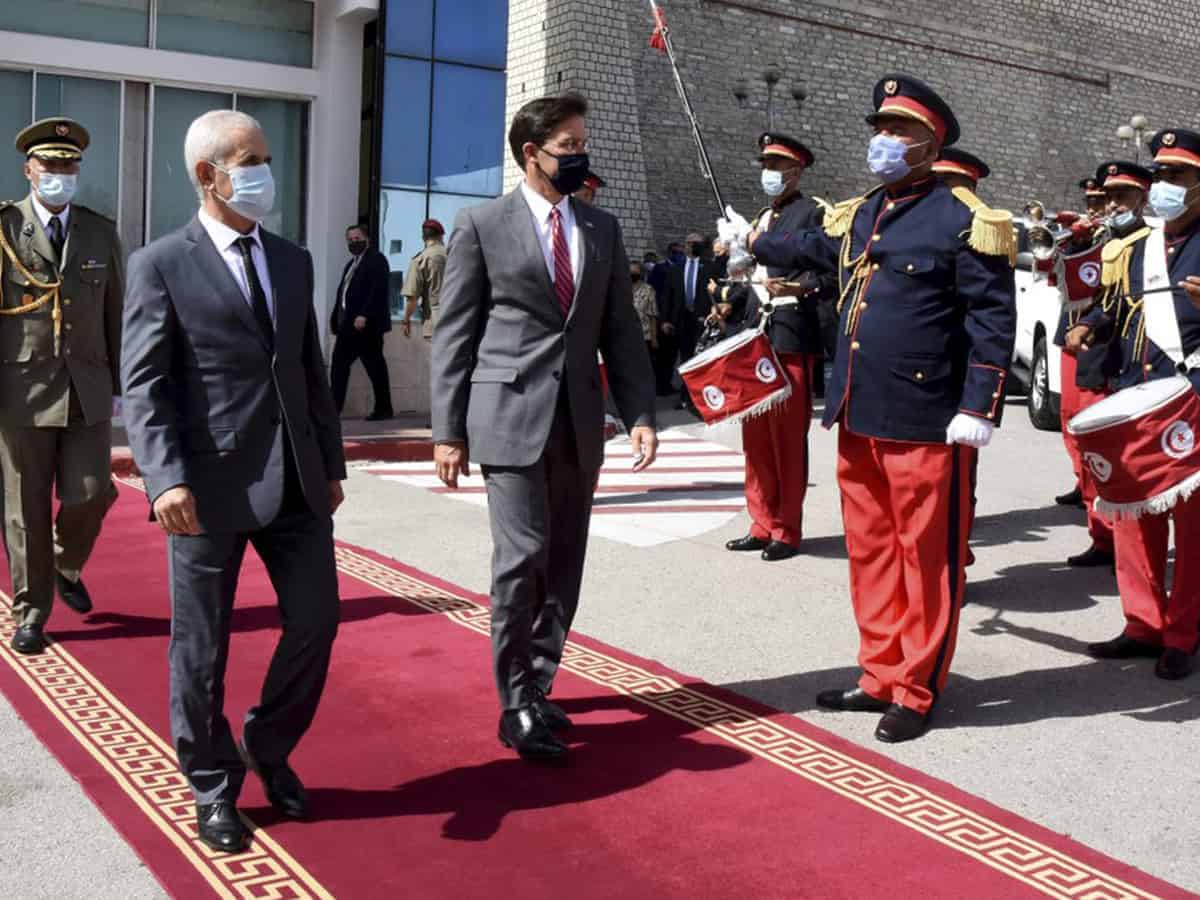
As US President Donald Trump’s first term nears its end, Secretary of Defense Mark Esper has launched an extraordinary diplomatic odyssey. Last week, he visited three North African capitals — Tunis, Algiers and Rabat — to affirm US interests in the region and its commitment to regional security.
In Tunisia and Morocco, he signed 10-year defense agreements that were cautiously described as “road maps” to be fleshed out after next month’s US election. Esper recognized Algeria as “a committed counterterrorism partner.” However, given that the country fought a long battle with lethal extremist elements in the 1990s, it has little need for US expertise. In Tunisia, Esper made it clear that the US’ diplomatic outreach was aimed at countering the influence of Russia and China in the region. He spoke of their “malign, coercive, and predatory behavior.”
Esper’s tour was a belated recognition by the US that the North Africa and Mediterranean region has now become an arena for strategic competition with Moscow and Beijing.
Russia sees the Mediterranean as being of crucial importance for its security interests and great power aspirations. It is anxious to supplement its bases in Syria with others in North Africa, perhaps in Libya. For China, the ports of the Mediterranean are significant links in its Belt and Road Initiative (BRI).
While the US has been disengaged from the region, Russia has been working on building its ties with North African nations over the last few years. Its relations with Morocco have both economic and security components, covering trade, energy, agriculture, industry, and military supplies. Russia is also supporting its civilian nuclear energy program.
Algeria has been a traditional Russian defense partner, with Moscow regularly equipping the Algerian armed forces with fresh deliveries, most recently with the multi-role Su-30 fighters, Su-34 bombers, Mi-28 attack helicopters, combat vehicles, and two submarines. Energy, including nuclear energy, is also part of their bilateral cooperation.
Russia has also been backing Tunisia’s counterterrorism efforts with supplies of protective gear and attack helicopters, as well as aiding the development of its nuclear infrastructure.
In Libya, Russia is directly involved in the ongoing civil conflict, with supplies of Russian military equipment and mercenaries from its private military contracting company, Wagner, supporting Khalifa Haftar, the military leader who is fighting the Tripoli-based government headed by Fayez Al-Sarraj. Though, in June, Haftar’s forces failed to take Tripoli, mainly due to the entry of Turkish advisers and Syrian mercenaries brought in by Ankara, Russia is now actively working to bring the contending domestic parties together, along with their foreign sponsors, including Turkey and Egypt.
China’s policy of non-interference in the domestic politics of other countries makes it an attractive partner for North African states. Its ties with these countries have focused mainly on trade and investments. In 2016, China overtook France as the No. 1 exporter to Algeria, while it has also begun to sell arms to that country. In April 2019, a Chinese company completed the construction of the world’s third-largest mosque in Algiers.
In October 2018, China and Morocco began a “new journey” in their relationship, with Beijing setting up two solar parks near Marrakesh, possibly the world’s largest. China has also substantially funded an industrial city in Tangier, giving China a technological center near a major port. China has also given a substantial grant to Tunisia to enhance its counterterrorism capabilities.
The BRI has facilitated China’s economic and investment links, not only with the North African states but also with Israel and Southern European nations such as Greece, Slovenia, Croatia, Italy and Spain. These, taken together, have given China a formidable place in the Mediterranean’s trade, infrastructure development, shipping, ports, manufacture, finance and tourism sectors.
Meanwhile, Turkey’s entry into North Africa through its military support for the Tripoli government and its claims to disputed gas reserves in the eastern Mediterranean have created a confrontation with Greece, Cyprus, Israel and Egypt, which are jointly exploring for gas in the region. Thus, Southern Europe, West Asia and North Africa are now all embroiled in competitions in and along the strategically important waters of the Mediterranean, which link Asia, Africa and Europe. Here, Russia, China and Turkey are challenging the influence of the Western powers.
Esper rushed to North Africa last week so that, even at this late stage, he could project a US role in regional security issues. But, as of now, the US appears quite irrelevant to the Mediterranean scenario.
As the Trump administration prepares for an election battle, other players are already on the regional stage. In the short term, it will be Russian diplomacy that will attempt to promote peace in Libya by seeking to reconcile the interests of Egypt and Turkey so that a domestic political process can be successfully implemented.
Looking further ahead, as the US remains embroiled in its electoral processes and the EU finds itself unable to muster a shared sense of purpose or mobilize the resources required to cope with these regional challenges, it will be Russia and China that will shape a new Mediterranean order — with new providers of security and new peace-makers.
Talmiz Ahmad is an author and former Indian ambassador to Saudi Arabia, Oman and the UAE. He holds the Ram Sathe Chair for International Studies, Symbiosis International University, Pune, India.

